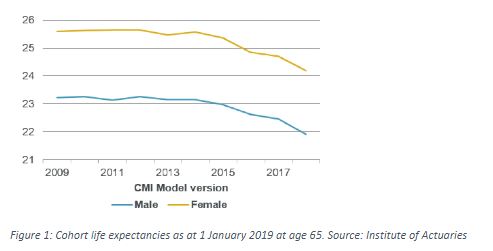These are not just numbers, these are lives
Life expectancy in the UK has fallen, again. The trend that started in 2010-2011 has worsened. The total fall in life expectancy compared to 2015 projections is 13 months for men and 14 months for women. Figure 1 from the Institute for Actuaries report shows just how much life expectancy at aged 65 years has declined for men and women.
These latest figures are no surprise to those who have been raising the alarm about life expectancy since as early as 2014. Extensive research on 30,000 excess in deaths in 2015 called for an urgent investigation to determine whether rising deaths were linked to austerity. Yet the Department of Health and Social Care described this work as “a triumph of personal bias over research.” Concern over 10,000 extra deaths in the first few months of 2018 eventually led to a promise of Government investigation. Despite the urgency, and worsening outcomes, nine months later it seems that this has still not occurred.
It is little surprise the number of people happy with how the health service is run is at its lowest level in a decade. Half of people asked said the Government does not spend enough on the NHS. It is a testament to its staff that, even now, 71% of people gave “quality of care” as their main reason for satisfaction with the NHS.
‘Health statistics represent people with the tears wiped off.’ The quote, attributed to the epidemiologist Sir Austin Bradford Hill, is a pertinent reminder with the release of another set of worsening health outcomes. In all the debate and disagreement on the cause of the health crisis in the UK, little consideration is given to the people these numbers represent. Infant mortality has risen in the UK. This means that more babies are dying in the UK than before, and experts predict this will “soar” unless effective action is taken. And now a recent report found that death rates for 20 to 24 years old increased between 2013 and 2016—more young people are dying in the UK than before. These are not just numbers, these are lives.
Protecting the health of a population is a key part of the social contract between a government and its electorate. Any stall in improvements, or worse still, reversal of trends in key indicators like life expectancy and infant mortality, point to a failure by society. The growing evidence of worsening health outcomes resulting in, put bluntly, deaths of babies, young people, and those over 65, means the arguments that this was a “blip”, caused by “flu”, or simply fluctuations in the data, are no longer worthy of debate. Neither will focusing on individual behaviour improve outcomes. The deepening health crisis in the UK requires society-wide, political intervention.
Theresa May’s government, and David Cameron’s before it, have overseen an evisceration of the social contract. Furthermore, Brexit in any form will only worsen our nation’s health, not least due to a reduction in the workforce, with the loss of healthy, young migrants. Urgent action is needed to halt the growing number of deaths in the UK. Without an urgent and deliberate change of course, these statistics will likely to continue to worsen. And these statistics represent human lives.
See also:

Lucinda Hiam is a doctor and honorary research fellow at the London School of Hygiene and Tropical Medicine.
Competing interests: LH is supported by a grant from the Network for Social Change
Martin McKee is professor of European public health at the London School of Hygiene and Tropical Medicine.
Competing interests: None declared.


